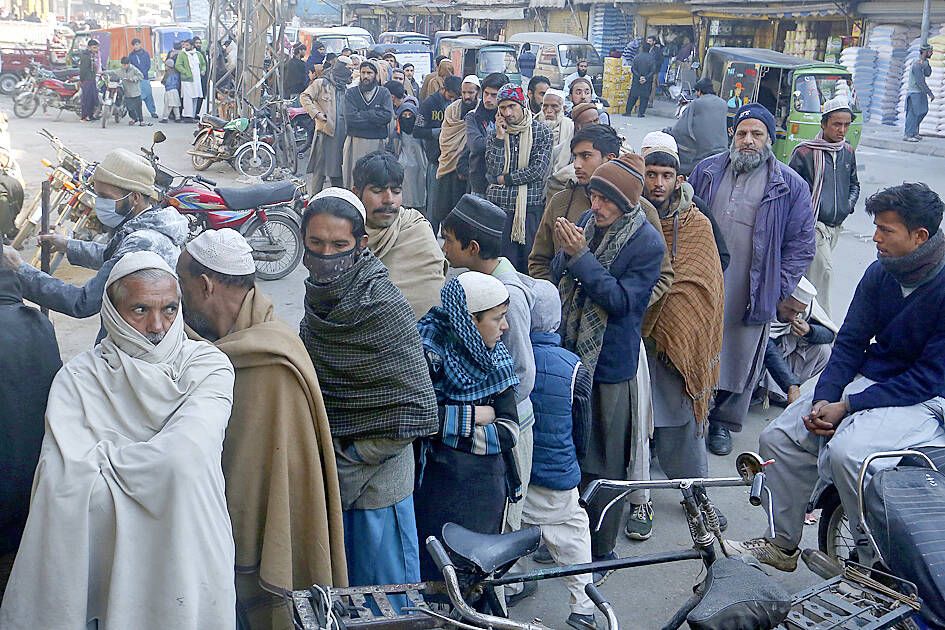Pakistan was yesterday set to ask for billions in international support for its recovery from the aftermath of last year’s devastating floods and to help it better resist climate change.
To meet its huge needs, Pakistan and the UN were cohosting an international conference in Geneva, Switzerland, to urge countries, organizations and businesses to step up with financial and other support for a long-term recovery and resilience plan.
Pakistani Prime Minister Shehbaz Sharif and UN Secretary-General Antonio Guterres were to launch the one-day event, which was also to feature speeches by heads of state and government.

Photo: AP
French President Emmanuel Macron, his Turkish President Recep Tayyip Erdogan and European Commission President Ursula von der Leyen were also to address the conference via video link.
According to Pakistan’s Resilient Recovery, Rehabilitation and Reconstruction Framework, which it was planning to officially present at Monday’s conference, US$16.3 billion would be needed in all.
Pakistan’s government aims to cover half that amount with “domestic resources,” including its development budget and through public-private partnerships, but it is looking to the international community to cover the remainder, with the hope that yesterday’s conference would generate significant pledges of support.
About 450 participants from about 40 countries have registered for the event, including representatives of the World Bank and several multilateral development banks.
“The waters may have receded, but the impacts are still there,” UN Development Programme Administrator Achim Steiner said ahead of the conference, describing the floods as “a cataclysmic event.”
“There is a massive reconstruction and rehabilitation effort that needs to be undertaken,” he said.
The flooding, which killed more than 1,700 people and affected about 33 million others, still has not receded in some southern parts of the country.
Millions of people remain displaced, and those who have been able to go home are often returning to damaged or destroyed homes and mud-covered fields that cannot be planted.
Food prices have soared, and the number of people facing food insecurity has doubled to 14.6 million, UN figures showed.
The World Bank has estimated that up to 9 million more people could be dragged into poverty as a result of the flooding.
Pakistan and the UN have said that the event would be broader than a traditional pledging conference, as it aims to set up a long-term international partnership focused on recovery, but also on boosting Pakistan’s climate resilience.
Pakistan, with the world’s fifth-largest population, is responsible for less than 1 percent of global greenhouse gas emissions, but is one of the most vulnerable nations to extreme weather caused by global warming.

THE TRAGEDY OF PUNCH: Footage of the seven-month-old Japanese macaque has gone viral online after he was rejected by his mother and formed a bond with a soft toy A baby monkey in Japan has captured hearts around the world after videos of him being bullied by other monkeys and rejected by his mother went viral last week. Punch, a Japanese macaque, was born in July last year at Ichikawa City Zoo. He has drawn international attention after zookeepers gave him a stuffed orangutan toy after he was abandoned by his mother. Without maternal guidance to help him integrate, Punch has turned to the toy for comfort. He has been filmed multiple times being dragged and chased by older Japanese macaques inside the enclosure. Early clips showed him wandering alone with

Australian Prime Minister Anthony Albanese yesterday said he did not take his security for granted, after he was evacuated from his residence for several hours following a bomb threat sent to a Chinese dance group. Albanese was evacuated from his Canberra residence late on Tuesday following the threat, and returned a few hours later after nothing suspicious was found. The bomb scare was among several e-mails threatening Albanese sent to a representative of Shen Yun, a classical Chinese dance troupe banned in China that is due to perform in Australia this month, a spokesperson for the group said in a statement. The e-mail

South Korea would soon no longer be one of the few countries where Google Maps does not work properly, after its security-conscious government reversed a two-decade stance to approve the export of high-precision map data to overseas servers. The approval was made “on the condition that strict security requirements are met,” the South Korean Ministry of Land, Infrastructure and Transport said. Those conditions include blurring military and other sensitive security-related facilities, as well as restricting longitude and latitude coordinates for South Korean territory on products such as Google Maps and Google Earth, it said. The decision is expected to hurt Naver and Kakao

TENSIONS: The march went ahead without clashes, but arrests were still possible as police investigate suspects behind Nazi salutes, racist slurs and homophobic insults Thousands of people on Saturday marched in southeastern France under heavy security in tribute to a far-right activist whose killing, blamed on the hard left, has put the country on edge. The crowd — many wearing black and some covering their lower faces with masks — marched through the city of Lyon carrying flowers and placards bearing pictures of Quentin Deranque and the words: “justice for Quentin” and “the extreme left kills.” The 23-year-old died from head injuries following clashes between radical left and far-right supporters on the sidelines of a demonstration against a politician from the left-wing France Unbowed